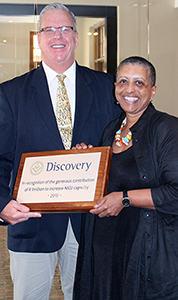Latest News Archive
Please select Category, Year, and then Month to display items
17 June 2020
|
Story Dr WP Wahl

The Division of Student Affairs (DSA) prioritises innovation to meet the challenges of food insecurity and malnutrition among students. To this end, several student volunteers and student governance structures are collaborating with the DSA on various initiatives.
During 2019, various conversations were held about the possibility of creating a health-promoting food environment at the UFS where students and staff are well informed and empowered to take appropriate action regarding their food and nutritional needs. These conversations resulted in an institutional strategy to address the food environment at the UFS. Student representatives serve on a technical committee that directs the implementation of this strategy. In this regard, several initiatives have already been launched.
Students from residences and other student communities have planted vegetable gardens on the Bloemfontein Campus with the assistance of KovsieACT and the Faculty of Natural and Agricultural Sciences. Students and staff are already harvesting and distributing vegetables to needy students every week. Measurements were put in place to continue this during the COVID-19 period. The following vegetables were planted: spinach, cabbage, beetroot, broccoli, cauliflower, and carrots.
Food parcels, donated by Tiger Brands and Gift of the Givers, are continuously handed out by DSA staff and student volunteers. In this regard, 540 food parcels have already been handed out on the Bloemfontein Campus during the COVID-19 period alone. During the same time, 117 students received food parcels on the Qwaqwa Campus. The innovation of this food parcel project rests on the fact that business, NPOs, UFS students, and DSA staff are collaborating to address food insecurity and malnutrition.
More collaborative initiatives will be implemented over the next 12 months. The DSA staff and students are already working with the Department of Dietetics and Consumer Sciences to create information packages about the preparation of low-budget nutritious meals.
Related article:
Vegetable tunnels established to continue the fight against food insecurity
Neonatal Care Unit receives donation to expand capacity
2015-10-28
 With the best care and technology available,
the survival rate of premature
babies is about 85%. The neonatal intensive
care unit at the Universitas hospital can now
expand its capacity thanks to a donation of
R1 million by the Discovery fund.
From the left is Prof André Venter.
Head: Department of Paediatrics and
Child Health at the UFS, and mrs Ruth Lewin,
Head: Corporate Sustainability at Discovery.
|
The smallest people need the greatest care. This care is being provided by the neonatal unit in the Children’s Wing of the Universitas Hospital. This project of the University of the Free State (UFS), under the leadership of Prof Andre Venter, has led to several miracles regarding child health since its inception.
Now, thanks to a donation of R1 million rand from the Discovery fund, this unit can expand its capacity and treat more premature babies.
About 14% of babies in South Africa are born before the 37th week of pregnancy. These babies are born with a very low birth weight, and are in need of critical care. The neonatal intensive-care unit at Universitas Hospital is currently equipped to take care of about 14 premature babies at a time, from birth to discharge. However, because of the high incidence of premature births in the hospital’s service area, the unit needs about 45 beds.
The aim of the Children’s Wing Project is to expand the neonatal intensive-care unit in order to meet the demands of the hospital’s service area, which reaches as far as the Southern Cape. The Discovery Fund recently donated R1 million to the project, which will be used to expand the capacity of the neonatal intensive-care unit.
“With the best care and technology available, the survival rate of premature babies is about 85%. Without this, half of all premature babies would die,” says Prof Venter, Head: Department of Paediatrics and Child Health at the UFS.
“This is the reason why private and public partnerships, such as the one with Discovery, are essential to make specialised services available to the most vulnerable people. Discovery has made a significant contribution to the project without which we would not have been able to expand the capacity of the unit